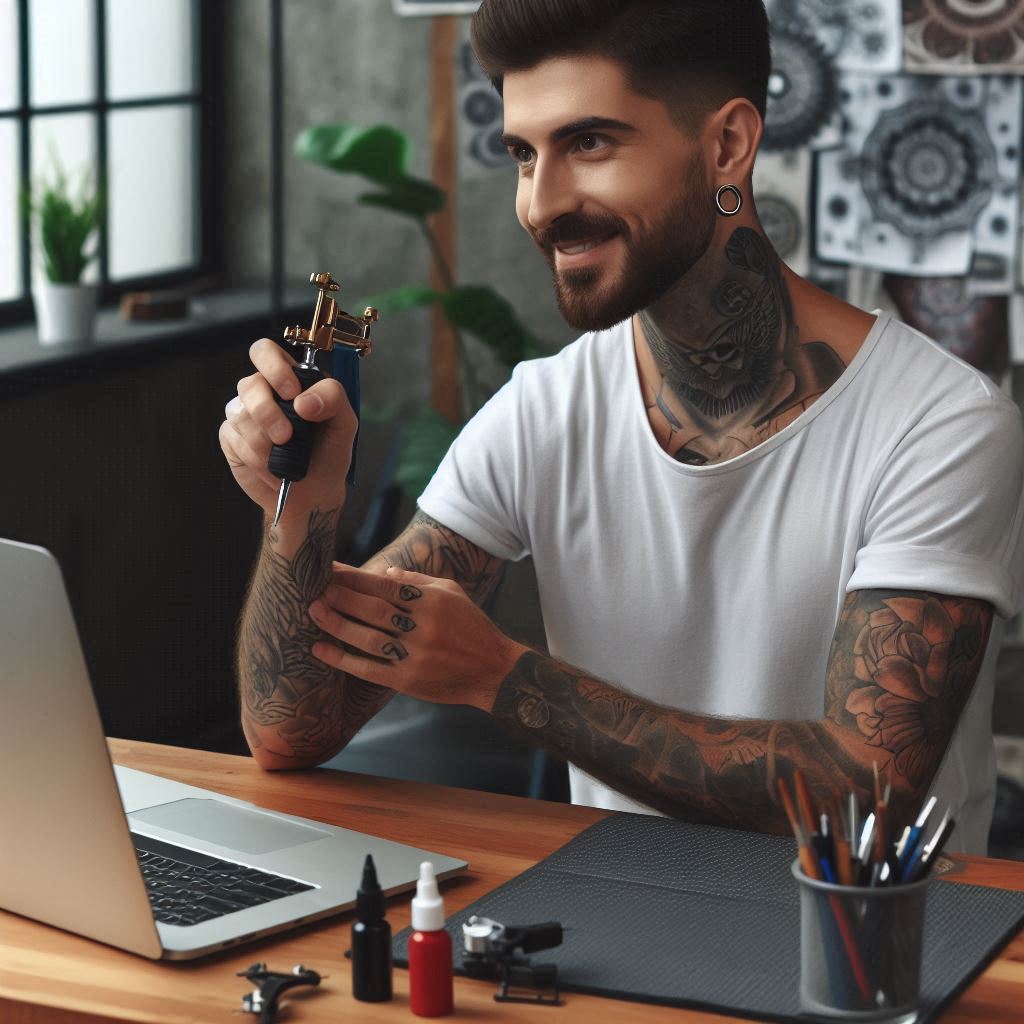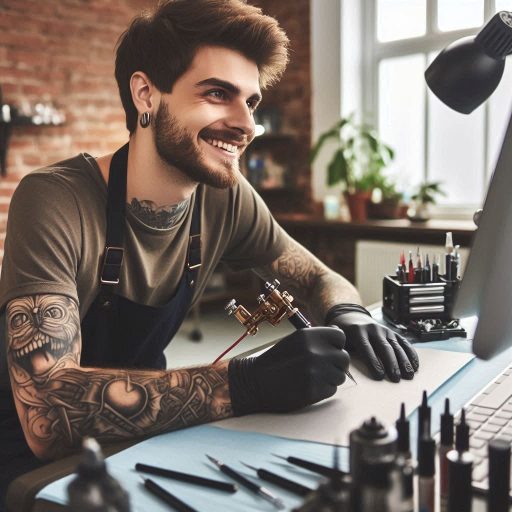Introduction
Setting the right price for your tattoo art is crucial for your success as a tattoo artist.
By accurately pricing your work, you not only ensure that you are compensated fairly for your time and talent but also attract the right clientele who value your craftsmanship.
Several factors come into play when determining the price of a tattoo.
These include the size and complexity of the design, the location on the body where the tattoo will be placed, the artist’s skill level and experience, and the geographical location of the tattoo studio.
Consider the size and complexity of the design
When pricing your tattoo art, one of the key factors to consider is the size and complexity of the design.
Larger and more intricate designs typically require more time and skill, resulting in a higher price tag.
Larger and more intricate designs typically require more time and skill
It’s important to recognize that creating a larger tattoo or one with intricate details will require more time and skill from the tattoo artist.
This is because larger designs cover more surface area, while intricate details demand a high level of precision and attention to detail.
- More time: A larger tattoo will naturally take longer to complete, as the artist will need to cover more skin with their design.
This means that the artist will need to dedicate more hours to the tattoo, which should be reflected in the pricing. - More skill: Intricate designs require a higher level of skill from the tattoo artist.
Whether it’s creating intricate linework, shading, or intricate patterns, a higher level of skill is necessary to ensure the design turns out as intended.
How size and complexity can affect pricing variations
When discussing pricing variations based on size and complexity, it’s important to consider the following factors:
- Base rate: Start with a base rate for your tattoos, which can vary depending on your experience, location, and reputation.
This base rate should serve as a starting point for determining the pricing of your tattoos. - Per hour or per session: Some artists prefer to charge by the hour or by the session, especially for larger and more complex designs.
This can ensure that the artist is compensated fairly for their time and effort in creating the tattoo. - Additional charges: For particularly intricate designs that require additional time and resources, you may consider charging extra.
This can cover the additional materials used, as well as the increased time and skill required to execute the design.
Ultimately, when pricing your tattoo art, it’s important to take into account the size and complexity of the design.
By considering these factors, you can ensure that you are fairly compensated for your time and skill, while also providing your clients with high-quality tattoo art.
Read: Inspiring Tattoo Art Projects and Collaborations
Evaluate the location on the body where the tattoo will be placed
When pricing your tattoo art, one important factor to consider is the location on the body where the tattoo will be placed.
The location can have a significant impact on the overall price of the tattoo due to various factors.
Certain areas are more difficult to tattoo and may require more skill
- Areas with sensitive skin or complex shapes can be more challenging to tattoo.
- Tattooing on bony areas or areas with a lot of movement can also require more expertise.
- Some locations, such as the ribs or neck, may be more painful for the client, affecting the overall experience.
- Tattooing on areas with hair or folds of skin can also present challenges for artists.
How location can impact pricing decisions
- Tattoo artists may charge more for tattoos in difficult locations to account for the extra time and skill required.
- Some artists may have a flat rate for tattoos, while others may charge based on the complexity of the design and location.
- Popular locations, such as the forearm or calf, may be priced higher due to higher visibility and demand.
- Clients should discuss the location of their tattoo with the artist to get an accurate price quote.
Overall, the location of the tattoo on the body plays a significant role in pricing decisions, and it is essential for both artists and clients to consider this factor when determining the cost of tattoo art.
Read: Creating Stunning Floral Arrangements: Pro Tips
Take into account the experience and skill level of the tattoo artist
More experienced artists may charge higher rates due to their expertise
One key factor to consider when pricing your tattoo art is the experience and skill level of the tattoo artist.
Experienced artists typically charge higher rates due to their expertise in the craft.
Their years of practice and knowledge contribute to the quality of their work.
Quality work is essential in the tattoo industry as it reflects the artist’s skills and professionalism.
Transform Your Career Today
Unlock a personalized career strategy that drives real results. Get tailored advice and a roadmap designed just for you.
Start NowClients are willing to pay more for a well-executed tattoo that meets their expectations.
Importance of quality work and how it affects pricing
Here are some points to consider when determining how the experience and skill level of the tattoo artist can affect pricing:
- Reputation and Portfolio: An artist with a strong reputation and impressive portfolio of work will likely charge more for their services.
Clients are willing to pay for the assurance of receiving top-notch results. - Specialization and Expertise: Tattoo artists who specialize in specific styles or techniques may charge higher rates due to their unique skills.
Specialized artists often have a niche market that appreciates their expertise. - Training and Education: Artists who have undergone extensive training or have formal education in tattoo art may command higher prices.
Clients value the dedication and knowledge that comes from continuous learning and improvement. - Time and Effort: Creating a custom tattoo design or intricate artwork requires time and effort.
Experienced artists may spend more hours perfecting a design, resulting in a higher price tag for their services. - Demand and Availability: High demand for a particular artist’s work can drive up prices.
Artists with limited availability or a long waiting list may increase their rates to manage their workload effectively.
It’s important to recognize the value that experienced and skilled tattoo artists bring to the table.
While pricing may be higher, the quality and expertise they offer can result in a tattoo that lasts a lifetime.
Read: Tattoo Removal: Methods and Effectiveness

Factor in the time and effort required to complete the tattoo
Time spent on consultations, design preparation, and actual tattooing should be considered
When pricing your tattoo art, consider the time and effort you invest.
Each tattoo involves several stages, starting with consultations.
During these meetings, you discuss ideas, styles, and client expectations.
Time spent here is crucial and should be factored into your pricing.
Next comes design preparation. Crafting a unique design takes creativity and skill.
You may need to sketch multiple concepts before finalizing one.
This design phase is time-consuming, and your pricing should reflect the effort involved.
The actual tattooing process is the most intensive part. Each tattoo varies in complexity and size.
More intricate designs require additional time and focus, affecting your overall pricing.
Be transparent with clients about how long you expect the process to take.
How pricing can reflect the level of detail and customization involved
Additionally, pricing should reflect the level of detail in the tattoo.
Highly detailed tattoos often require more time to execute.
Consider the skill level required for shading, line work, and color blending.
The more complex the design, the higher the price should be.
Customization also plays a significant role in your pricing strategy.
Transform Your Career Today
Unlock a personalized career strategy that drives real results. Get tailored advice and a roadmap designed just for you.
Start NowCustom tattoos require more effort than standard designs.
They often involve back-and-forth communication and adjustments.
This level of personalization adds to the time and should influence your rates.
In summary, your pricing should encompass all aspects of the tattoo process.
From consultations to design preparation and the tattooing itself, every stage matters.
By factoring in the time and effort required, you can set fair and transparent prices.
This approach helps ensure clients appreciate the value of your artistry and commitment.
Read: Step-by-Step Guide to Starting a Floral Design Business
Research the market rates in your area and compare pricing strategies
When it comes to pricing your tattoo art, there are several factors to consider in order to ensure you are fairly compensating yourself for your time and talent.
One important aspect to keep in mind is researching the market rates in your area and comparing pricing strategies.
Look at other tattoo studios and artists to determine average prices
By researching the market rates in your area, you can ensure that you are setting prices that are competitive yet reflective of your skill level.
It’s also important to consider the benefits of competitive pricing and how it can attract clients to your studio.
Benefits of competitive pricing and how it can attract clients
Competitive pricing can help you stand out in a crowded market and attract clients who may be price-sensitive.
By offering competitive rates, you can appeal to a wider range of potential customers and potentially increase your client base.
However, it’s important to strike a balance between competitive pricing and ensuring that you are fairly compensated for your time and expertise.
You don’t want to undercut your prices to the point where you are undervaluing your work, but you also don’t want to price yourself out of the market.
One strategy you can use is to offer promotions or discounts for first-time clients or for multiple tattoos done in a single session.
This can help attract new customers while still maintaining your overall pricing structure.
Ultimately, pricing your tattoo art requires a careful consideration of the market rates in your area, your own skill level and experience, and the value you place on your time and expertise.
By taking the time to research and compare pricing strategies, you can set prices that are both fair to you and attractive to potential clients.
Transform Your Career Today
Unlock a personalized career strategy that drives real results. Get tailored advice and a roadmap designed just for you.
Start NowConsider the cost of materials and equipment used for the tattoo
When pricing your tattoo art, it is essential to consider the cost of materials and equipment used for the tattoo.
Here are some factors to keep in mind:
Quality Ink
Using high-quality ink is crucial for achieving vibrant and long-lasting tattoo designs.
However, quality ink comes at a higher price point compared to generic brands.
Consider the brand reputation and performance when selecting ink for your tattoos.
Needles
The type and quality of needles used in tattooing can significantly impact the final result.
Cheaper needles may result in inconsistent lines or poor healing, while premium needles offer precision and smooth execution.
Factor in the cost of needles when pricing your work.
Sterilization Supplies
Ensuring proper sterilization of equipment is non-negotiable in the tattoo industry.
Sterilization supplies such as autoclaves, gloves, and disinfectants are essential for maintaining a safe and hygienic working environment.
These supplies come with a cost that should be factored into your pricing.
Impact on Pricing Decisions
The cost of materials and equipment used for tattooing directly affects your pricing decisions.
Higher-quality supplies translate to better results and client satisfaction, but they also increase your overhead expenses.
It is crucial to strike a balance between offering quality work and covering your costs to ensure a sustainable business model.
Communicate Openly with Clients
When it comes to pricing your tattoo art, effective communication with your clients is key.
You want to make sure they understand your pricing structure and feel comfortable with the cost of their tattoo.
It’s important to have an open and honest discussion with clients about pricing and payment expectations.
Be clear about how you price your tattoos and what factors contribute to the cost.
Provide Clear Estimates and Breakdowns
Offering detailed estimates and breakdowns of pricing can help clients understand where their money is going.
This transparency can build trust and ensure they feel confident in your pricing.
Transform Your Career Today
Unlock a personalized career strategy that drives real results. Get tailored advice and a roadmap designed just for you.
Start NowImportance of Trust and Professionalism
When discussing pricing with clients, emphasize the importance of trust and professionalism.
Let them know that you value their business and want to provide fair and honest pricing for the work you do.
In a nutshell, pricing your tattoo art is about more than just setting a number. It’s about building trust, establishing professionalism, and communicating openly with your clients.
By following these tips and guidelines, you can ensure that your pricing discussions are productive and successful.
Discover More: What Does an Art Conservator/Restorer Do?
Discover More: Case Studies of Successful Exhibition Designs
Conclusion
Take into account design complexity, size, and placement for pricing.
Consider your experience, skill level, and reputation in setting rates.
Factor in overhead costs like equipment, supplies, and studio rent.
Remember to adjust prices based on demand, season, and location.
Communicate openly with clients about pricing to manage expectations.
Ensure transparency in your pricing to build trust with customers.
Value your time, effort, and expertise when determining fair prices.
Ultimately, pricing your tattoo art is a balance of creativity and business savvy.




